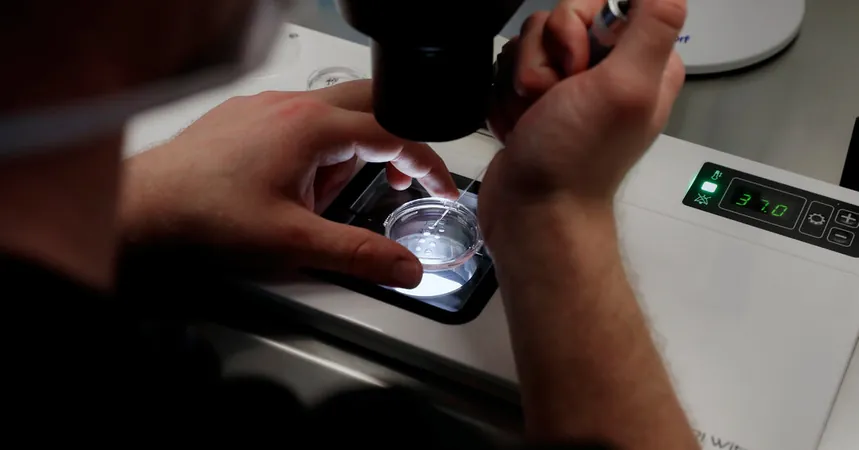
Surprising Link: IVF Babies Exhibit Slightly Higher Risk of Heart Defects!
2024-09-27
Recent Research Findings
Recent research has unveiled a startling yet nuanced reality regarding babies conceived through in vitro fertilization (IVF) and other assisted reproductive technologies (ART). A comprehensive study, which analyzed medical records from over seven million children born in Nordic countries, has revealed a small but significant increase in the incidence of major heart defects among these babies, raising important questions for prospective parents considering fertility treatments.
Expert Commentary
Dr. Ulla-Britt Wennerholm, a prominent obstetrician and gynecologist at the University of Gothenburg in Sweden, emphasized the findings during a presentation this Thursday. “While there’s an increased risk, the absolute likelihood of major heart defects remains quite low. This is reassuring for families seeking fertility assistance,” she noted.
Study Overview
The study scrutinized children born between 1984 and 2015 across Denmark, Sweden, Norway, and Finland. It was found that the risk of major heart defects in babies conceived through IVF was approximately 36% higher compared to those conceived naturally. However, it’s critical to observe that this translates to less than 2% of these IVF babies being affected—an infrequent occurrence nonetheless.
Clarifying Factors
Intriguingly, the risk of heart defects did not vary based on whether couples utilized Intracytoplasmic Sperm Injection (ICSI)—where sperm is directly injected into an egg—or traditional IVF methods. Additionally, the type of embryo transfer, whether immediate or following a freeze period, did not influence heart defect rates.
Potential Causes
Dr. Jeffrey Kuller, a specialist in maternal-fetal medicine from Duke Health, reiterated the documented link between ART, including IVF, and a variety of birth defects affecting various systems of the body. However, researchers are still grappling with the cause of this association. Some hypotheses suggest that the IVF process itself, which involves egg extraction, fertilization in a lab environment, and subsequent embryo transfer, may be a factor. Others advocate that the genetic predispositions found in parents with infertility may elevate the risk of congenital anomalies in their offspring; for instance, infertility in men has been correlated with alterations on the Y chromosome that can lead to various birth defects.
Complications of Multiple Births
Moreover, the prevalence of multiple births (twins or more) in IVF treatments further complicates the discussion. The research highlighted that twin pregnancies, irrespective of their method of conception, displayed the highest risk for heart defects. The frequent transfer of multiple embryos during IVF to enhance pregnancy success has historically accounted for the occurrence of multiple births.
Changing Trends in IVF Practices
However, recent years have witnessed a shift in this practice—most notably in 2020—where over 80% of IVF procedures now involve single embryo transfers, a marked rise from just 20% in 2011. This trend follows increasing awareness around the complications associated with twin pregnancies.
Looking Forward
Dr. Wennerholm is optimistic that forthcoming data will reflect a decline in heart defects due to this evolving approach in embryo transfer. “This serves as a crucial message to both clinicians and patients: prioritize single embryo transfers,” she advised.
Conclusion
Overall, while the association between IVF and heart defects is an important consideration, the absolute risk remains low. The evolving protocols in fertility treatments may soon lead to even better outcomes for future families hoping to conceive through assisted reproductive technologies.




 Brasil (PT)
Brasil (PT)
 Canada (EN)
Canada (EN)
 Chile (ES)
Chile (ES)
 España (ES)
España (ES)
 France (FR)
France (FR)
 Hong Kong (EN)
Hong Kong (EN)
 Italia (IT)
Italia (IT)
 日本 (JA)
日本 (JA)
 Magyarország (HU)
Magyarország (HU)
 Norge (NO)
Norge (NO)
 Polska (PL)
Polska (PL)
 Schweiz (DE)
Schweiz (DE)
 Singapore (EN)
Singapore (EN)
 Sverige (SV)
Sverige (SV)
 Suomi (FI)
Suomi (FI)
 Türkiye (TR)
Türkiye (TR)